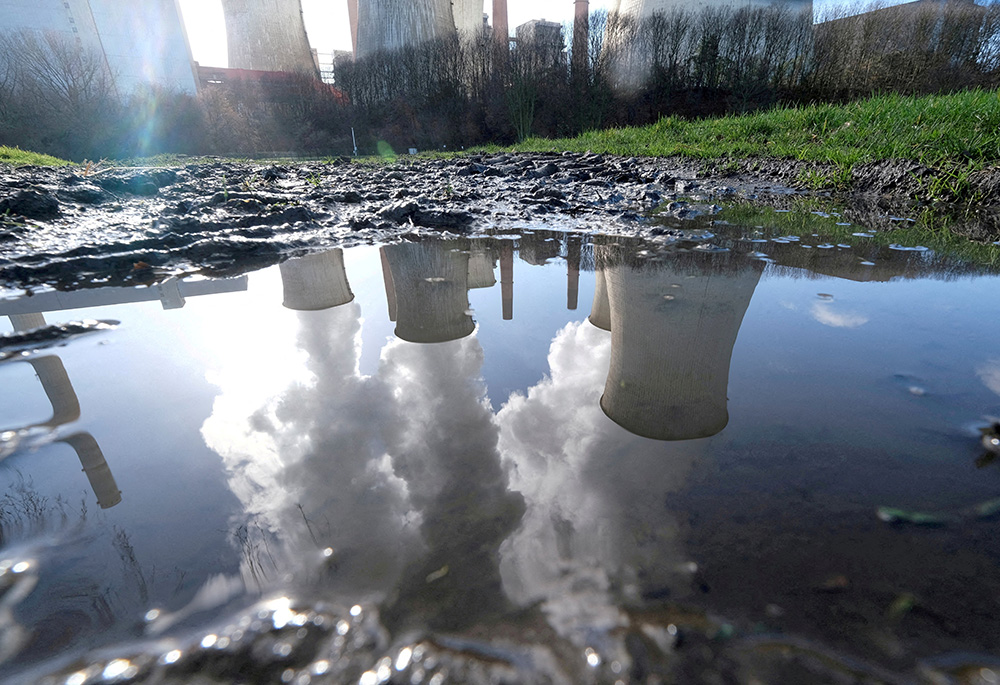
A coal power plant in Neurath, Germany, is seen reflected in a puddle of water Feb. 5, 2020. (CNS/Reuters/Wolfgang Rattay)
Many of the technologies and tactics to avert the worst impacts of climate change exist today. While still a major challenge, what's missing mostly is the political and financial will to wield them at full force.
So says the latest major report from the world's foremost scientific body on climate change. The report, focusing on mitigation efforts to limit rising temperatures, and with it the fallout from increasing heat, was issued Monday, April 4, by the United Nations Intergovernmental Panel on Climate Change.
The report reiterated that immediate, rapid and massive societal shifts this decade are required to meet the world's goal under the Paris Agreement to limit average global temperature to 1.5 degrees Celsius — a threshold that climate scientists say will expose millions of people to increasing droughts, heatwaves and extreme storms, and with it, result in greater rates of poverty, migration and health issues, all consequences expected to harm already vulnerable communities the most.
The nearly 3,000-page IPCC report, compiled by 278 authors from 65 countries, is the third issued by the international scientific group in the past nine months as part of the sixth assessment cycle. The first updated the physical science of climate change, and the second, issued in March, detailed how climate change is impacting our world and efforts to adapt. A final synthesis report will be released in the fall.
At current emissions rates, the world will burn through its remaining carbon budget to meet the 1.5 C target within approximately eight years, according to the Intergovernmental Panel on Climate Change.
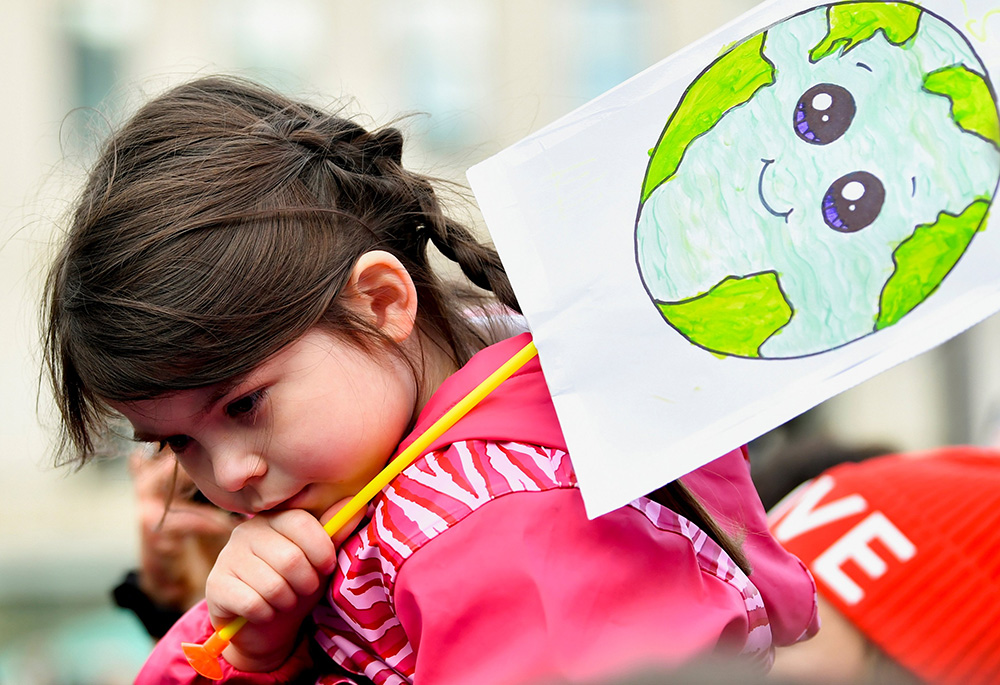
A child in Glasgow, Scotland, holds a placard at a "Fridays for Future" march Nov. 5, 2021, during the U.N. Climate Change Conference. (CNS/Reuters/Dylan Martinez)
Catholic development groups operating across the world said the latest IPCC report was "a clarion call" and made clear that countries must focus on "transformative solutions" with no time to waste.
"Its message is crystal clear: we need climate action now in the form of deep and urgent emissions reductions, and well before 2030, to stay below 1.5°C," said CIDSE, a network of Catholic international justice organizations, in a statement. "As Catholic Development agencies, we are inspired by Pope Francis to call for urgent action on the climate emergency."
Salesian Fr. Joshtrom Kureethadam, coordinator of the ecology and creation sector of the Vatican Dicastery for Promoting Integral Human Development, told EarthBeat that the IPCC report shows that the time to act is now, and the next few years are "crucial" in shaping a habitable world for people today and generations to come. He said it was encouraging that the report documented signs of a renewable energy transition, including renewable energy making up the vast majority of new energy sources in recent years.
"All this is doable if we are willing to change our behavior, if our political leadership is able to step in. But we don't want to wait for others to lead. We think we should be leading our communities," he said.
"We are at a crossroads. The decisions we make now can secure a liveable future," Hoesung Lee, chair of the IPCC, said in a statement. "We have the tools and know-how required to limit warming."
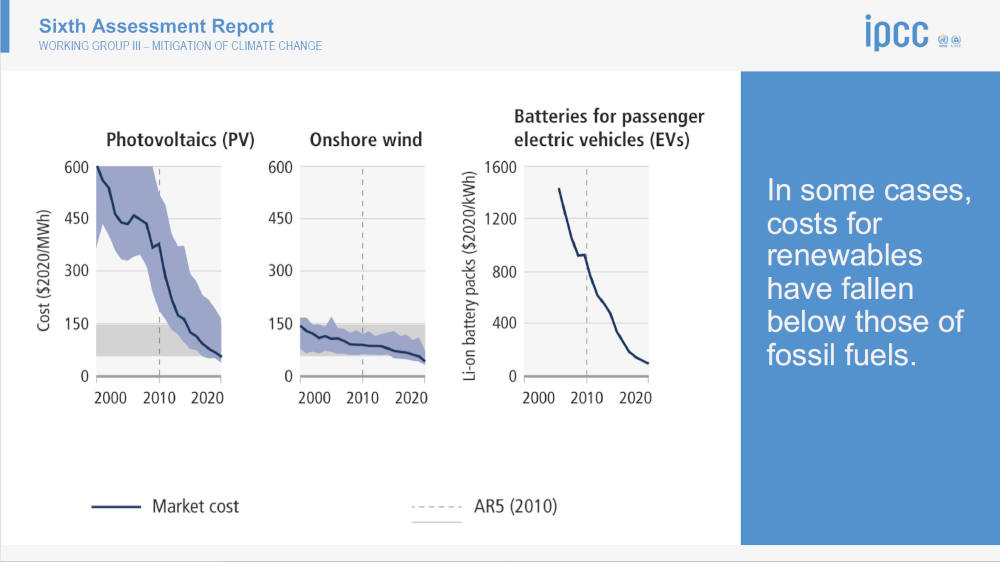
A new report from the United Nations Intergovernmental Panel on Climate Change stated that many of the technologies to limit climate change exist today, but so far national actions have fallen short in implementing them in substantial ways to meet the goals laid out in the Paris Agreement. (EarthBeat screenshot/IPCC)
In a joint statement, U.N. climate chief Patricia Espinosa and Alok Sharma and Sameh Shoukry, the heads of the COP26 and upcoming COP27 U.N. climate conferences, respectively, said the latest IPCC report "makes it clearer than ever that the window of opportunity to achieve [the 1.5 C goal] is rapidly closing."
"Despite the urgency of our task, there is hope. The window for action has not yet closed. … There is also clear evidence that — with timely and at scale cuts to emissions — countries can pursue a mitigation pathway consistent with limiting global warming" to 1.5 C, they said.
The new mitigation report concluded that the decade from 2010-2019 saw the highest average annual greenhouse gas emissions on record, and were 54% higher than 1990 levels. The carbon emissions released from 2010-2019 accounted for 17% of historical emissions since 1850. While overall emissions dropped slightly in 2020 at the start of the coronavirus pandemic, they rebounded by year's end. And since 2010, global emissions have increased across all major sectors.
"Human-induced climate change is a consequence of more than a century of net GHG emissions from unsustainable energy use, land-use and land use change, lifestyle and patterns of consumption and production," the IPCC report authors wrote. "Without urgent, effective and equitable mitigation actions, climate change increasingly threatens the health and livelihoods of people around the globe, ecosystem health and biodiversity."
The report reinforced that the release of emissions is uneven. Developed countries are responsible for 57% of historical carbon emissions, compared to .4% from the world's least developed nations, and the richest 10% of households account for between 36% and 45% of emissions.
"Richer countries must urgently kick their addiction to fossil fuels and mass consumption," said Alistair Dutton, director of Scotland Catholic International Aid Fund. "This is the only way to stop the world overheating and leaving a planet that is habitable for future generations. If we don't, our children and grandchildren will never forgive us."
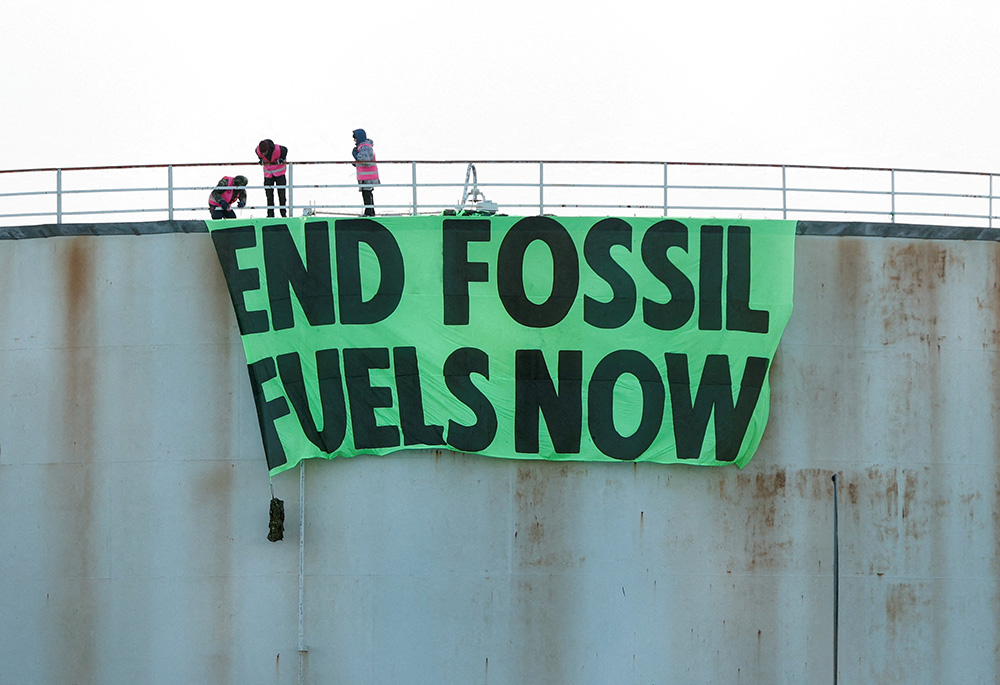
Activists at Esso West London Terminal in Staines, England, hang a sign on a storage tank April 1. (CNS/Reuters/John Sibley)
Global temperatures have risen an average of 1.1 C since the Industrial Revolution at the turn of the 18th century. Countries under the 2015 Paris accord agreed to work to hold temperature rise "well below" 2 C and to strive to limit it to 1.5 C.
So far, the national climate pledges countries issued ahead of COP26 in Glasgow, held in November, would result in 3.2 C warming, according to the IPCC, or well short of both Paris Agreement targets. At the end of COP26, countries agreed to reassess and submit new climate targets before COP27 later this year in Egypt.
The urgency of climate change has yet to be matched by an equivalent political response. For decades, the fossil fuel industry and its political allies have sowed doubt about the science and sought to delay attempts to phase out the use of coal, oil and gas. And recent global events, from Donald Trump's election in the U.S. to the coronavirus pandemic to the Russian invasion of Ukraine, have drained momentum and drawn political attention away from the global threat posed by climate change and the need to transition away from fossil fuels.
Despite that, the IPCC report stressed that a pathway to 1.5 C still exists.
It pointed to positive signs, such as the rapidly declining costs of solar and wind energy, along with lithium-ion batteries, and the rapid expansion of solar energy and electric vehicles. As of 2020, more than 20% of global emissions fell under carbon taxes or emissions trading systems, and 56 countries representing 53% of emissions had passed climate laws to slash greenhouse gases.
But it's also not enough.
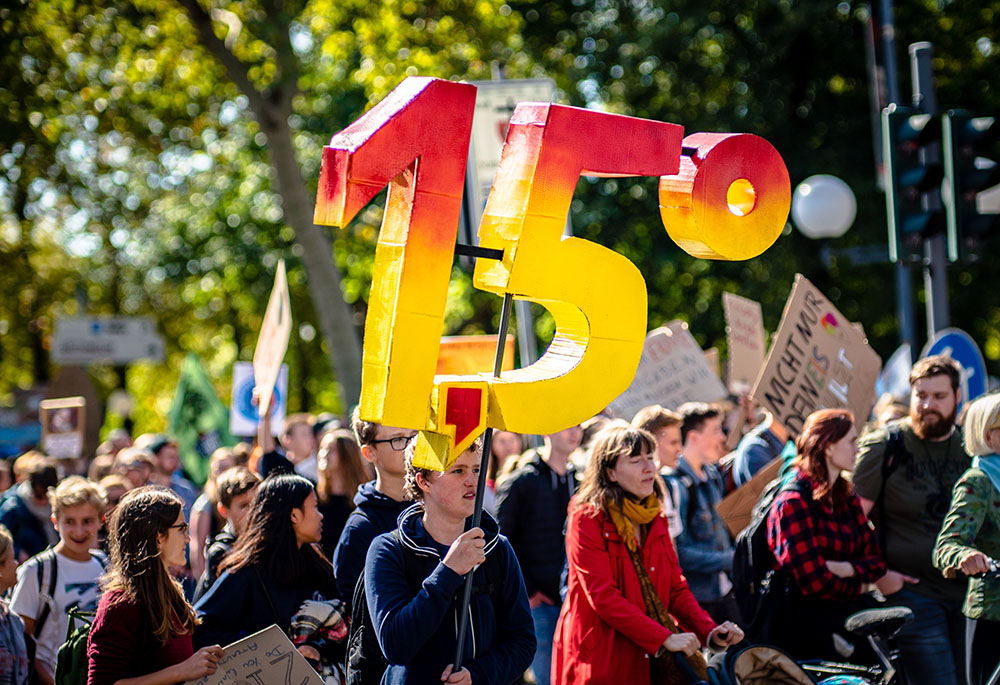
Fridays For Future, Sept. 20, 2019 in Bonn, Germany (Unsplash/Mika Baumeister)
The IPCC said that global emissions have to peak no later than 2025 to keep 1.5 C in range, and emissions need to be cut nearly in half by 2030 and reach net-zero by 2050. Even then, the report estimates that average temperature rise will likely overshoot 1.5 C temporarily.
Limiting warming to 1.5 C or 2 C will "involve rapid and deep and in most cases immediate GHG emissions reductions in all sectors," the report stated.
Models in the report achieving the 1.5 target show the world rapidly transitioning from fossil fuels to low- or zero-carbon energy sources. Nearly all electricity would need to come from such sources by midcentury, while the use of coal would fall to near zero, and oil and gas slashed dramatically, with up to $4 trillion in stranded fossil fuel infrastructure. Further rollout of energy efficiency, especially in buildings, and conservation efforts, through reforestation and ecosystem restoration, are also key facets to cutting emissions, as is designing cities in ways that encourage public transit, reduce energy demand and enhance access to green spaces.
The IPCC said that taking such steps can have co-benefits, including reducing exposure to pollution, improved health and less congestion, and that mitigation tactics are "a necessary part of development," including meeting the U.N. Sustainable Development Goals. It added that "individual behavioral change is insufficient for climate change mitigation unless embedded in structural and cultural change."
Susan Gunn, director, Maryknoll Office for Global Concerns, said that each of those strategies are "essential for a global just transition" to a world powered by renewable and emissions-free energy.
One area the Catholic organizations disagreed with the report was on the use of carbon capture and storage technologies to pull emissions from the atmosphere, which the IPCC said would be necessary to offset emissions from hard-to-decarbonize sectors. The technology's inclusion was part of debates that delayed the report's release by several hours.
CIDSE and its members called carbon capture and other negative emissions technologies "false solutions." They have joined environmental groups in saying fossil fuel companies will seek to use those technologies as a means to continue burning more coal, oil and gas. Instead, they have advocated expansive rollouts of renewable energy and agroecology, and for ending all government subsidies for fossil fuels.
Advertisement
"It is never a solution to rely on risky technologies that have not yet developed or proven effective, nor is it a solution to continue accepting more risks already posed to the environment and people because of following mitigation models that rely on such technologies," CIDSE said in its statement.
Another major area for increased activity is investments. Currently, public and private investments for fossil fuels continue to outpace those for climate mitigation and adaptation measures. The report said that financing for clean energy will need to increase 3 to 6 times over current levels.
The good news, the IPCC report said, is that "there is sufficient global capital" to close the investment gaps. The bad news? There are barriers to doing so, such as inadequate assessments of climate-related risks and investment opportunities. The IPCC said that governments can help alleviate risk concerns through "clear signaling" they are aligning state funding with strong climate policies.
The IPCC report said that while the costs of addressing climate change appear high — roughly 2.6%-4.2% losses in global GDP, and in the electricity sector alone, an estimated $2.3 trillion annually between 2023 and 2052 — inaction will cost far more, both monetarily and the toll on human and other life. "The economic benefits on human health from air quality improvement arising from mitigation action can be of the same order of magnitude as mitigation costs, and potentially even larger," the report said.
In its statement, CIDSE said it was encouraging that the IPCC report highlighted how investor-state dispute settlements can hinder more ambitious climate action by governments over fears that corporations or investors could sue over the impacts on their businesses.
Josianne Gauthier, CIDSE secretary general, said that "corporate power is hindering climate justice" and that a full response to climate change must involve addressing current economic systems.
"As Pope Francis has said, we cannot live within an economy based on insatiable and irresponsible growth. We are motivated to challenge the system based on the direct experiences of people at the forefront of climate change, who need mitigation urgently," she said.
Kureethadam told EarthBeat it's understandable if people find climate reports like the latest from the IPCC disturbing, because it's from that point that they can become aware of the challenges and mobilized to act. He said that people can also draw hope through the actions that are happening, including through the Vatican's Laudato Si' Action Platform that Francis has invited Catholics across the world to join as a way to embrace sustainability and an ecological conversion.
"People are coming together, so I see that as an element of hope. We don't need to get discouraged," Kureethadam said. "It's urgent, so we cannot afford to postpone. That time is over. The report is so clear."








